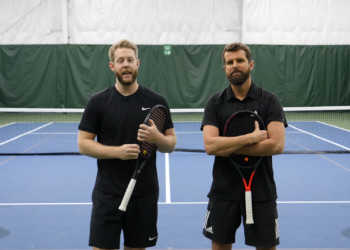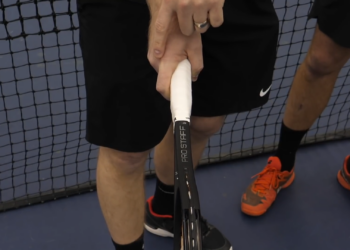I’ve played more tennis matches than I can count, from juniors to college ball to now hitting with my students and I’ll tell you this.
The players who show up “cold” rarely walk away with the win.
You can have the cleanest strokes on the practice court, but if you’re not dialed in, physically, mentally, and strategically, when it’s go time, the match can slip through your fingers before you even get a sweat going.
And I hear it all the time:
- “Why do I always start slow?”
- “Why do my legs feel like lead in the first set?”
- “Why can’t I find my rhythm until it’s too late?”
These questions usually stem from skipping or half-baking the prep process. Great match preparation isn’t about superstition or a rigid checklist.
It’s about confidence, walking onto the court knowing you’ve done the work, tuned your game, and eliminated the chaos.
PlayYourCourt worked with thousands of players stuck in this cycle, players who trained hard but couldn’t convert that work into wins. The fix almost always starts here: learning to prepare with purpose.
Because your first weapon in any match is your preparation. It’s what lets you step up to the baseline already in rhythm, already believing, already ready.
Let’s break down exactly how to do that.
48 Hours Out: What to Do Two Days Before a Tennis Match
Control the Controllables
One of the most powerful things you can do before a match? Stop stressing about what you can’t control and double down on what you can.
Start with hydration. This might sound basic, but most players are already behind by the time they hit the court. You want to be sipping water consistently, not chugging a bottle in the parking lot.
Here’s a simple rule: your urine should run clear by the night before the match. If it’s yellow, drink up.
Next up.
Your meals. Keep it clean and consistent. Avoid greasy food and anything you wouldn’t eat before a lesson. Balanced meals with lean protein, complex carbs, and a little fat will fuel you without bogging you down. No “last supper” junk food binges.
Now, let’s talk gear.
Two days out is your window to make sure your racquets are freshly strung, your grips aren’t slick, and your shoes still have tread.
I always tell players to check their emotional gear too, your lucky wristband, your favorite hat, whatever boosts your vibe. These little rituals matter more than you think.
Taper Down, Don’t Shut Down
A mistake I see all the time? Players train hard the entire week, then grind through one last intense session the night before the match and wonder why they feel slow and stiff the next day.
Here’s the move: shift your practice from intensity to sharpness.
Think shorter sessions that focus on your strengths. Groove your serve. Lock in your favorite patterns. Hit with rhythm, not pressure. You’re sharpening the moves you already trust.
And if you’re wondering, “Should I rest or play the day before?”, great question.
For most players, light movement the day before helps, not hurts. That might mean 30 minutes of hitting, a light stretch, or just some footwork drills and serves. The key is to stay loose, not burn out.
So don’t go dark. Taper smart. By controlling what you can and tuning your engine instead of redlining it, you set yourself up to walk onto the court confident, not cooked.
Ready for the night-before strategy? Let’s dive into that next.
The Night Before: How to Set Up a Confident Match Day
Develop Your Game Plan
The night before a match is where your mindset either sharpens or spirals. And if you want to walk on court with clarity, you’ve got to start here: with a plan.
If you’ve got any way to scout your opponent, do it.
Watch past matches, ask around, or think back to your last time playing them. Are they shaky under pressure? Weak backhand? Struggle with short balls? Take notes. If not, no stress, you can still prep like a pro.
This is where tactical intention comes in. It might sound like: “I’m going to serve and volley on second serves” or “I’ll attack any ball that lands short in the middle third.” These are anchors. They keep you grounded when momentum swings or nerves creep in.
And here’s a mindset shift we live by at PlayYourCourt: a match is always a win if you grow.
Visualize Victory – Literally
The best players train their brains too. And that starts with mental reps.
Before you call it a night, take 5 quiet minutes to visualize your match. See yourself serving confidently, staying loose in rallies, and adjusting smart when things get tight. Feel your feet moving fast and your breathing staying slow.
This is brain science. Mental rehearsal activates the same pathways as physical reps.
To kick nerves to the curb, pair that visualization with powerful self-talk.
Skip the “hope I play well” routine. Try:
“I’ve put in the work.”
“I’m ready.”
“This is my court.”
Even one sentence, said with belief, can rewire how you walk into match day.
Sleep is Strategy
You’re not going to outwork poor recovery and no, you’re not the exception. One bad night of sleep can tank your energy, timing, and decision-making. That’s not opinion. That’s physiology.
So prioritize a full 8 hours like you would a training session. Turn off the screens early. Skip the sugar bomb dessert.
If your mind starts racing, maybe you’re excited, maybe you’re anxious, use calming breathwork to shift gears. I like the 4-7-8 method: inhale 4, hold 7, exhale 8. Repeat until you feel your system slowing down.
Remember, showing up rested is part of the preparation. It’s the difference between reacting to the match and owning it.
Morning of the Match: Wake Up with a Purpose
Fuel Wisely
Match day isn’t the time to reinvent your diet or eat like it’s Sunday brunch. You want clean, predictable fuel that keeps you energized, not bloated.
I always recommend starting the day with something light and carb-friendly: a banana, a plain bagel with a little peanut butter, maybe a trusted sports bar you’ve had before.
The keyword here is familiar. This isn’t the morning to try that new protein smoothie or load up on supplements you saw online. If it’s not already in your routine, skip it.
And remember: you’re fueling for movement, not a nap. Aim to eat 60–90 minutes before your warm-up, and sip water steadily throughout the morning. You should feel light, loose, and ready, not sluggish or stuffed.
Solo Warm-Up Strategies (No Hitting Partner? No Problem)
Can’t find someone to hit with before your match? Don’t panic, you can still get your body and timing in sync.
Start with jump rope or some light jogging to get your heart rate up. Then move into dynamic stretches, leg swings, arm circles, shoulder rolls. Grab a resistance band and fire up your rotator cuffs. Trust me, if you want your serve popping from point one, you’ve got to prep that shoulder.
No court? No problem. Use a wall for groundstrokes, simulate serve tosses in slow motion, or shadow swing your footwork patterns. Even 15 minutes of this gets your nervous system firing.
And if you’ve got access to PlayYourCourt’s video drills, this is a great time to run through a few high-tempo ones. We designed them for players exactly like you, those who want to feel ready, not rusty, even when they’re warming up alone.
So don’t let the lack of a partner throw you off. With the right tools and intention, you can step on court feeling sharp, fluid, and match-ready.
1 Hour Before: Your On-Site Match Routine
The Real Warm-Up Happens Before the Warm-Up
If you’re waiting until the official 5-minute warm-up to get your body going, you’re already behind.
That quick rally at the start of a match is meant to sharpen, not activate. You need to be physically ready before you ever step on court.
That means taking 20–30 minutes to move intentionally: jog a few laps, run through dynamic stretches, do some resistance band work to wake up your shoulders and hips.
If you’re not breaking a sweat before the match even starts, you’re likely to fall into the “slow start” trap we hear about all the time at PlayYourCourt.
Starting sluggish is a flaw in your routine. Fix the routine, and the first-set fog disappears.
Use the Official Warm-Up to Scout
Once the match warm-up begins, it’s time to shift from prepping your game to learning theirs.
This is your free preview. Use it.
Throw them a slice and see how they handle it. Hit a loopy topspin and check their footwork. Charge the net once or twice. You’re collecting intel.
Watch for little giveaways:
- Do they turn late on their backhand?
- Do they shift awkwardly when you hit behind them?
- Are they gripping the racquet like they’re wringing out a towel?
We coach our players to be curious and tactical. If you notice they hesitate on high balls, guess what your rally strategy should involve? Yep, height and spin.
Preparation doesn’t stop when the match starts; it evolves with every warm-up stroke.
Calm the Chaos: Mental Focus on Match Day
Let’s talk about the elephant in the brain: nerves.
It doesn’t matter how many lessons you’ve taken or how dialed in your forehand is, if your heart is racing and your thoughts are spiraling, you’re not going to perform the way you know you can.
This is the moment when players tell me, “I play great in practice, but I fall apart in matches.”
It’s not talent. It’s tension.
Here’s your fix: focus on your breath.
One deep inhale through the nose. Hold it for a count. Exhale longer than you inhaled. Repeat until you feel your shoulders drop. Then, create a between-points ritual, maybe you bounce the ball a specific number of times, fix your strings, or take a slow breath at the baseline.
These mini-routines aren’t superstitions. They’re anchors, mental resets that keep you focused, grounded, and emotionally steady no matter what the scoreboard says.
When you manage the chaos, you unleash your control. And that’s what separates match players from practice players.
In-Match Routines: Focus, Reset, Adjust
Between Points: Stay Present
Matches are rarely won with a single swing, they’re won in the moments between the swings.
After every point, whether you hit an ace or flubbed a sitter, take a breath. Literally. One slow inhale, one slow exhale. Let your shoulders drop. Reset your posture. Then reconnect with your game plan.
This is what separates competitors from reactors. I tell our PlayYourCourt members all the time: you don’t have to win every point you just have to stop losing focus.
That’s the pro mindset. Lose the point? Fine. But don’t lose the plot.
Changeovers Are Strategic Timeouts
Changeovers aren’t breaks, they’re opportunities. You’ve got 90 seconds. Use them.
Hydrate. Snack if it’s a longer match. But more importantly, run a quick diagnostic. Ask yourself:
- Am I sticking to my strategy?
- Are my targets landing where I want?
- What’s working? What needs a small tweak?
This is your moment to adjust before things spiral.
Emotional Self-Talk
If your internal voice is a critic instead of a coach, your performance is going to suffer. Period.
Self-talk is a weapon and you get to choose if it’s loaded with support or sabotage. Whether you’re battling nerves, frustration, or scoreboard pressure, the language you use matters.
So here’s a fun and surprisingly effective trick: give your brain something bold to focus on. One of my favorite examples from a student?
“Be a beautiful dang tyrannosaurus.”
It sounds silly, but it works. Why? Because it snaps you out of negative loops and reminds you to be bold, powerful, and playful.
Whatever phrase you choose, make sure it brings you back to presence and belief. Your mindset is part of your toolkit.
After the Match: Recovery to Ready Again
Cool Down Right
You just left it all out on the court, now it’s time to give your body the same care you gave your game.
Start with a light jog or a long walk to bring your heart rate down. Then hit some passive stretching hamstrings, hips, shoulders, calves.
Even five minutes of this can save you from the dreaded “second-day soreness” that wrecks your week.
And here’s the bonus: proper cooldown accelerates recovery, which means you’ll be ready to train, play, or compete again sooner.
Learn While It’s Fresh
Before the adrenaline fades and your brain shifts to lunch or your inbox, take five minutes to reflect. Grab your phone or a notepad and answer two questions:
- What worked today?
- What would I adjust next time?
Dig a little deeper too:
- “Did I stick to my game plan?”
- “Did I prep enough before walking on court?”
- “How was my energy in set one versus set three?”
PlayYourCourt is obsessed with helping players improve faster and that only happens when you build awareness. Don’t just play tennis. Study your game. Track your trends. And use every match to level up your next one.
Be the Player Who Shows Up Ready
Preparation is about showing up with purpose. From visualizing your serve to adjusting grips mid-match, the best players treat every minute before a match like it matters, because it does.
If you’re the kind of player who wants to get better, who’s tired of showing up underprepared or stuck at the same level, then it’s time to train smarter, not harder.
We built our entire platform for players like you.
We’re giving you every tool you need to improve, video tips, tactical challenges, match prep drills, live workshops, and the guidance of world-class coaches, all inside one membership.
👉 Ready to play better tennis, faster? Try PlayYourCourt FREE for 7 Days and prep for your next match like a pro.



